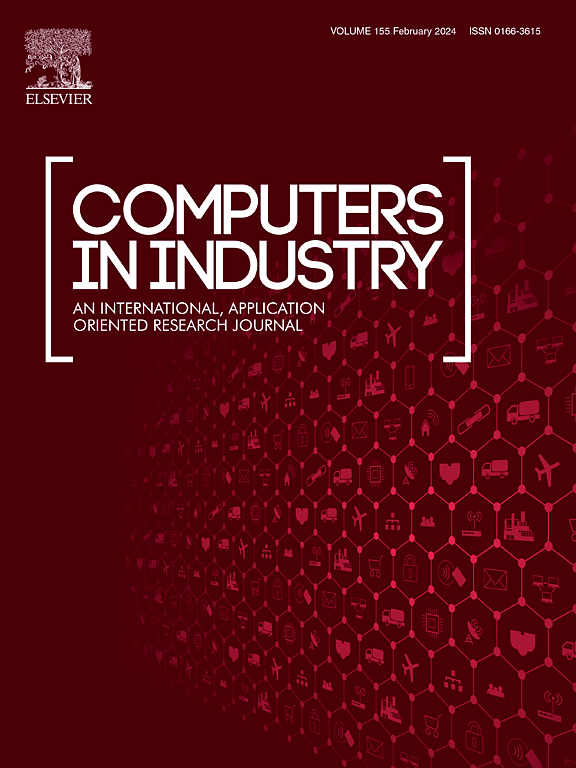UGP-KD: An unsupervised generalized prediction framework for robot machining quality under historical task knowledge distillation for new tasks
IF 8.2
1区 计算机科学
Q1 COMPUTER SCIENCE, INTERDISCIPLINARY APPLICATIONS
引用次数: 0
Abstract
Despite the extensive use of robots in numerous fields, condition-sensitive robotic machining errors represent a significant obstacle to their high-precision implementation. Prediction-based compensatory control represents a crucial approach to enhancing robot accuracy. The extant machining error prediction methods are beset with shortcomings, including inadequate feature extraction, limited generalizability with respect to working conditions, and the squandering of knowledge. Therefore, the influence mechanisms of robot errors by different working conditions and spatial ontology properties are explored in this paper. A spatial-temporal dual-view error prediction model is constructed for a single condition. Moreover, an innovative unsupervised generalized prediction strategy of machining error for new conditions under the historical task knowledge distillation of Multi-Teacher-Single-Student (MTSS) is proposed. This strategy enables the extraction and reuse of knowledge at three levels: teacher-teaching, student-learning, and generalized expansion. It also ensures the high-precision, lightweight, and high-efficiency prediction of machining error for unseen conditions. The proposed method was validated on constructed complex part inner wall features. The minimum mean absolute error (MAE) indicator for single condition prediction is 0.005 mm, which is a significantly more accurate result than other methods under comparison. Furthermore, the average MAE of unsupervised generalization for new conditions is 0.019 mm, which meets the practical application requirements. Furthermore, the distilled model complexity is reduced by 75 %, and the average inference efficiency is enhanced by over 95 %. This provides the potential for lightweight online deployment. The proposed method offers a robust foundation for prediction-based error online compensation, which is anticipated to facilitate the expansion of robots in high-precision scenarios.
UGP-KD:一种面向新任务的历史任务知识精化下机器人加工质量无监督广义预测框架
尽管机器人在许多领域广泛使用,但条件敏感型机器人加工误差是其高精度实现的重大障碍。基于预测的补偿控制是提高机器人精度的重要途径。现有的加工误差预测方法存在特征提取不足、对工况的泛化能力有限、知识浪费等缺点。因此,本文探讨了不同工作条件和空间本体属性对机器人误差的影响机理。建立了单条件下的时空双视角误差预测模型。在此基础上,提出了一种创新的多师单生历史任务知识精馏法下新条件下加工误差的无监督广义预测策略。这种策略可以在三个层次上提取和重用知识:教师教学、学生学习和广义扩展。它还确保了高精度、轻量化和高效率的加工误差预测。对构造复杂零件的内壁特征进行了验证。单条件预测的最小平均绝对误差(MAE)指标为0.005 mm,与其他方法相比,预测结果的准确性显著提高。新条件下无监督泛化的平均MAE为0.019 mm,满足实际应用要求。此外,提取的模型复杂度降低了75% %,平均推理效率提高了95% %以上。这为轻量级在线部署提供了可能。该方法为基于预测的误差在线补偿提供了坚实的基础,有望促进机器人在高精度场景中的扩展。
本文章由计算机程序翻译,如有差异,请以英文原文为准。
求助全文
约1分钟内获得全文
求助全文
来源期刊

Computers in Industry
工程技术-计算机:跨学科应用
CiteScore
18.90
自引率
8.00%
发文量
152
审稿时长
22 days
期刊介绍:
The objective of Computers in Industry is to present original, high-quality, application-oriented research papers that:
• Illuminate emerging trends and possibilities in the utilization of Information and Communication Technology in industry;
• Establish connections or integrations across various technology domains within the expansive realm of computer applications for industry;
• Foster connections or integrations across diverse application areas of ICT in industry.
 求助内容:
求助内容: 应助结果提醒方式:
应助结果提醒方式:


